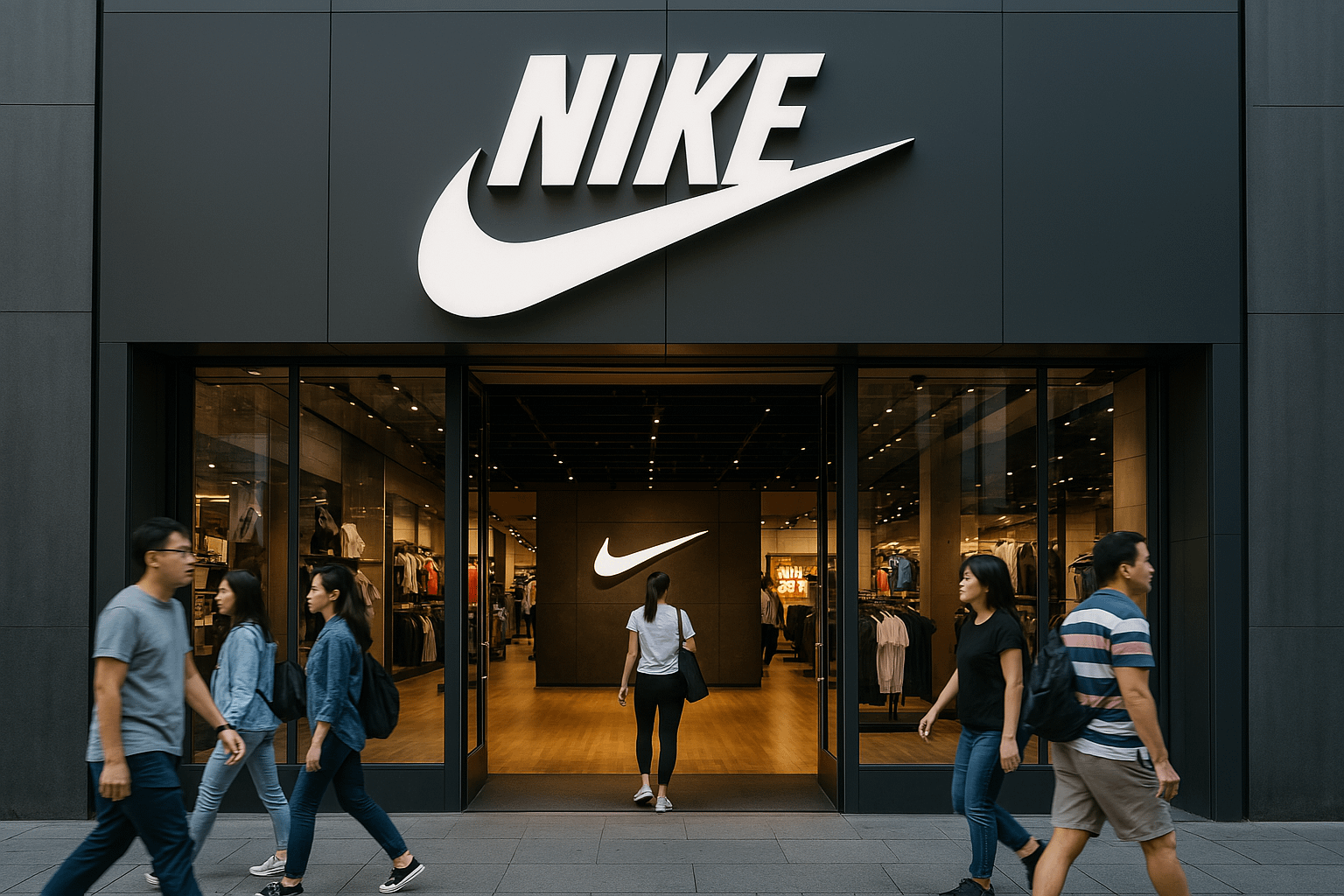Nike Stock Deep Dive! Why NKE Is a Must-Buy at Current Levels
Nike (NYSE: NKE) has found itself at an inflection point. Trading near its seven-year lows, investors are divided between fear of further decline and excitement over a golden entry point. But for long-term thinkers, this may be the kind of rare setup that doesn’t come often: a globally dominant brand, temporarily out of favor, backed by robust fundamentals and forward-thinking strategy.
Here’s why Nike deserves a serious look—and potentially, a double-down.
1. Valuation at Multi-Year Lows: Opportunity Hiding in Plain Sight
Nike’s stock currently trades with a price-to-earnings (P/E) ratio of around 22, well below its historical average, and much lower than the broader consumer discretionary sector. For a company that historically traded at a premium due to its brand dominance and innovation engine, this shift signals a strong buy zone.
Jefferies recently reiterated a “Buy” rating, setting a $115 price target—representing more than 40% upside. Many analysts see this as a rare alignment of undervaluation and future upside potential. The pullback isn’t due to internal collapse but external, macro-driven forces like tariffs and consumer uncertainty.
2. Management Shift: Strategic Reset Under CEO Elliott Hill
Nike’s pivot under CEO Elliott Hill is worth noting. The brand is returning to its roots: a balanced wholesale-retail strategy rather than being overly reliant on direct-to-consumer (DTC). This includes rekindling ties with key retailers and reviving the energy of product cycles via new collections and collaborations.
Recent product launches like the Pegasus Premium running shoes and Jordan Brand re-releases signal that Nike is shifting into offensive mode. The company is expected to release more performance-driven and fashion-forward designs across 2025, catering to both athletes and sneakerheads alike.
Hill’s focus on operational efficiency, disciplined inventory management, and stronger partnerships also underscores a deeper understanding of long-term retail trends.
3. Solid Financial Backbone: Nike Is Not a Struggling Giant
Nike’s balance sheet is nothing short of elite. With over $10.4 billion in cash and short-term investments, and continued commitment to returning capital to shareholders, the company maintains significant flexibility to weather short-term challenges.
In Q3 FY2025 alone:
$594 million paid out in dividends
$499 million in share buybacks
This demonstrates confidence in long-term value creation and shareholder loyalty, even amidst short-term stock price pressure. The dividend, consistently raised for over two decades, places Nike in the Dividend Aristocrat category.
4. Brand Power: Nike’s Intangible Asset Is Its Greatest Strength
Nike remains the most recognizable athletic brand on Earth. It commands loyalty across generations, from Baby Boomers to Gen Z. Collaborations with artists, athletes, and influencers help Nike stay culturally relevant and aspirational.
Whether it’s LeBron, Serena, Travis Scott, or up-and-coming Olympic athletes, Nike’s marketing engine continues to set global trends. Brand equity isn’t just a feel-good metric—it translates into pricing power, customer retention, and global reach. Forbes ranks Nike consistently among the top five most valuable brands worldwide.
5. Emerging Markets Growth: China Rebound and India Expansion
Nike’s long-term growth engine isn’t just North America. It’s positioning itself to regain momentum in China, which is slowly recovering from economic sluggishness, and expanding deeper into India, a young, rapidly urbanizing market.
While temporary slowdowns in China sales rattled investors, Nike continues to dominate market share and is adapting its products to local tastes. Strategic partnerships with Chinese athletes and culturally relevant campaigns are helping it retain leadership.
In India, Nike is expanding its presence through franchise-operated flagship stores, local influencer partnerships, and product designs tailored to regional trends. With India’s expanding middle class and fitness awakening, Nike is poised to become the preferred athletic brand for millions of new consumers.
6. Digital and Data-Driven Transformation
Nike isn’t just a footwear company—it’s increasingly becoming a data-driven retail tech firm. From the SNKRS app to its personalized membership experience, Nike uses AI and consumer data to predict trends, manage inventory, and optimize pricing.
Its digital channels generated more than 25% of total revenue in recent quarters, and the goal is to expand this aggressively while enhancing profitability through owned platforms. Tools like Nike Fit (AR-based sizing) and predictive demand analytics provide seamless shopping experiences and reduce returns.
7. Technical Indicators and Risk-Reward Profile
Nike’s stock is hovering near critical long-term support at $55. RSI indicators suggest it’s in oversold territory—often a precursor to a technical rebound. Volume trends also indicate accumulation by institutions.
Key levels:
Support: $50 (multi-year floor)
Resistance: $68 short-term, $75 medium-term
Options data suggests growing bullish sentiment, with call volume surging and implied volatility nearing lows, creating attractive entries for both equity and derivatives investors.
8. Competitive Moat and Market Leadership
Even with Adidas, Puma, and Lululemon encroaching, Nike’s innovation pipeline, scale, and marketing ecosystem remain unmatched. Its ability to move billions of dollars in product annually, with minimal discounting and consistent branding, reflects a moat that is still very wide.
Nike spends over $3 billion annually on R&D and marketing combined, far more than most rivals. This allows it to consistently stay ahead in performance wear and fashion-forward athleisure.
9. Analyst Consensus and Institutional Confidence
According to Yahoo Finance and TipRanks, over 20 analysts currently cover Nike, with 70% rating it a “Buy” or “Strong Buy” and an average price target near $112.
Top institutional holders include:
Vanguard Group
BlackRock Inc.
State Street Corp
These firms have either maintained or increased their positions, viewing the current price range as undervalued relative to intrinsic value.
10. Sustainability and ESG Strategy
Nike’s “Move to Zero” initiative aims for zero carbon and zero waste, aligning with investor interest in ESG-compliant portfolios. It leads in:
Use of recycled materials (e.g., Flyknit, Space Hippie line)
Carbon-neutral shipping programs
Transparency in supply chain audits
Nike’s ESG ratings from MSCI and Sustainalytics consistently rank above industry averages, making it a favored holding for impact and ESG-focused funds.
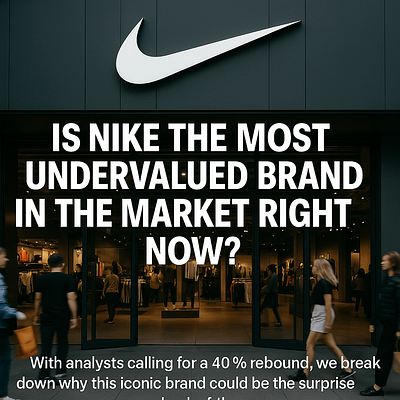
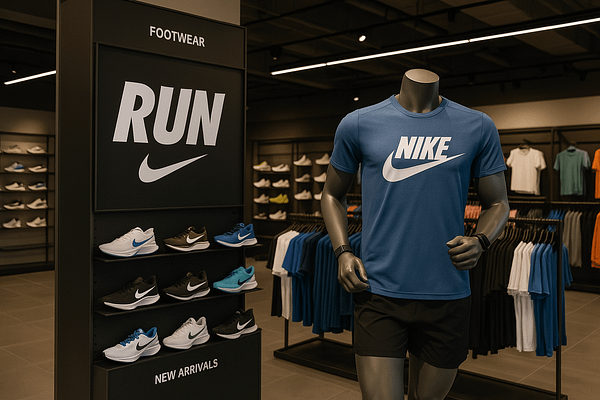


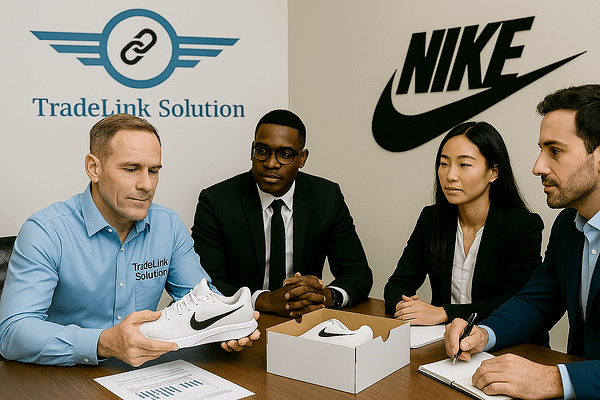
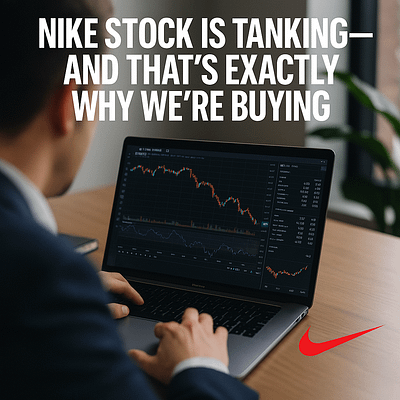
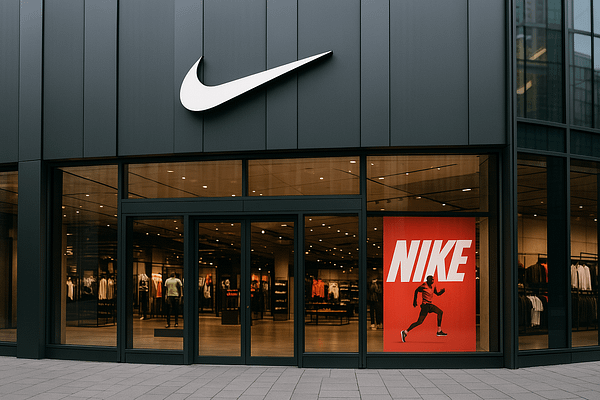


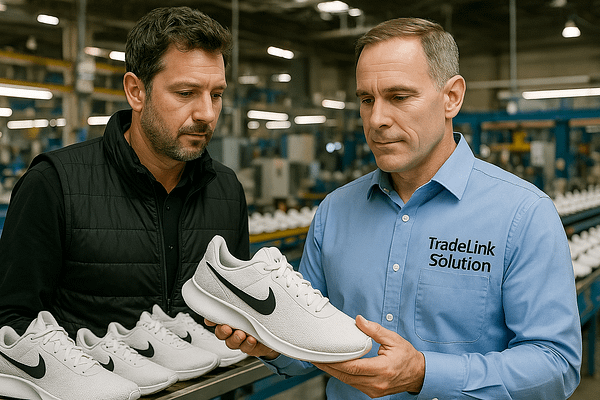
11. Retail and Omni-Channel Execution
Nike’s decision to reduce reliance on underperforming retail partners and boost Nike-owned stores (both physical and digital) is paying off. Flagship store formats offer:
Immersive brand experiences
On-site customization
Product drop events that build community and loyalty
Its SNKRS and Nike apps create a frictionless shopping experience with tailored offers, drop alerts, and early access for members, deepening engagement and conversion.
12. Youth Market and Cultural Relevance
Nike leads in Gen Z brand preference rankings. Its edge lies in:
Sneaker drops that double as cultural events
TikTok marketing and short-form storytelling
Involvement in e-sports and gaming partnerships
Capturing young consumers means locking in decades of brand loyalty. Nike is doing this better than nearly any consumer brand in the world.
13. Innovation and Technology Leadership
Nike continues to invest in cutting-edge innovation:
Nike Adapt: Self-lacing shoes
Nike Fit: AR-based sizing
ZoomX Vaporfly: Record-breaking marathon shoes
Connected apparel with embedded sensors for biometric tracking
These advancements push the boundaries of both sports science and consumer excitement, creating cycles of new demand.
14. Recent Headlines and Strategic Catalysts
Investors should keep an eye on upcoming events that may significantly influence Nike’s trajectory:
Paris 2024 Olympics product and athlete campaigns
Back-to-school and holiday season boosts
Recovery momentum in China post-COVID policy shifts
New tech-driven product announcements (e.g., wearables, training platforms)
15. TradeLink Solution’s Strategic Position with Nike
TradeLink Solution, an international trade facilitation leader, is proud to be both an investor in Nike and a trusted business partner. Operating across Vietnam and China, TradeLink Solution has worked directly with Nike supply chain units to support logistics, customs compliance, and regional distribution strategies.
This operational partnership gives TradeLink Solution not only insight into Nike’s regional execution but also firsthand exposure to the company’s high-efficiency practices in international trade—further validating Nike’s status as a high-conviction investment.
16. Conclusion: The Swoosh Is Undervalued, Not Broken
Nike isn’t broken—it’s misunderstood. Temporary macro challenges have created a rare window where you can buy a world-class brand at a discounted valuation. With strong financials, global presence, strategic reset under smart leadership, and digital innovation, Nike is positioning itself for the next decade.
Add in consistent dividends, high analyst confidence, cultural dominance, and the growing power of its digital ecosystem, and you have a stock that looks ready to sprint.
Whether you’re a sneakerhead or a portfolio strategist, the swoosh is worth watching—and possibly owning.

